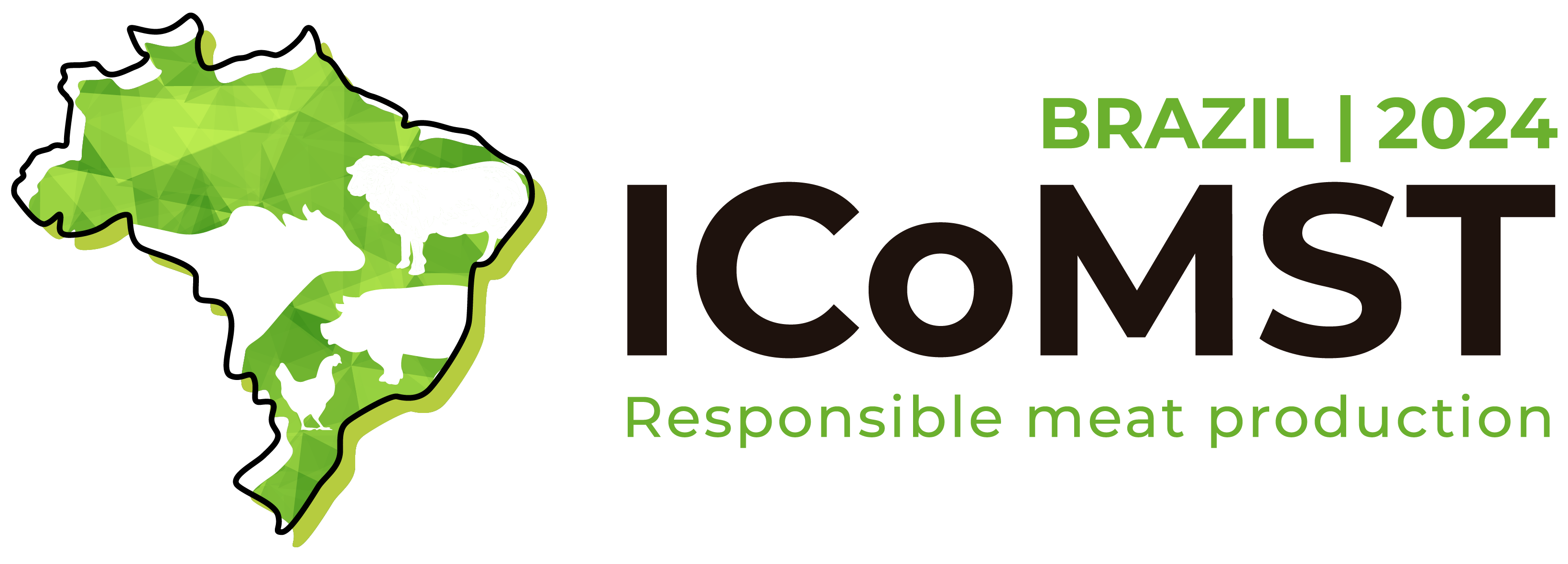One important component of the International Congress of Meat Science and Technology (ICoMST) is the PhD Course scheduled immediately prior to the start of the Congress (16th and 17th of August, 2024).
This course, which belongs to the tradition of the ICoMST, is intended to provide young researchers with the opportunity of meeting and learning from international experts in the field, during an intense 2-days course. The course venue will be at Bourbon Cataratas Do Iguaçu Thermas Eco Resort in Foz do Iguassu – Brazil. The program of this course is initially intended for PhD students. Nevertheless, MSc. students will be also considered based on spot availability.
The course theme of this year is “Advance Meat Science for Responsible Meat Production”. The scope of this PhD course will revolve around two main themes: Meat Production and Processing. Invited international experts will deliver interactive lectures on topics such as live animal and carcass merit evaluations, meat quality and palatability, meat processing, and novel technologies applied in these areas. Furthermore, a discussion panel composed by industry leaders will tackle “The Meat Value Chain” followed by questions from the course attendees. At the end of each day, a round table will be entertained to discuss the main aspects covered during the day.
Log in or Create Account to Register for the PhD course.
Program
To view the full program details, click here
PROUDLY SPONSORED:

Advance Meat Science for Responsible Meat Production
Course Coordinators
Saulo da Luz e Silva, PhD
University of São Paulo – Brazil
Marco Antonio Trindade, PhD
University of São Paulo – Brazil
Óscar López-Campos, PhD
Agriculture and Agri-Food Canada, Lacombe
Research and Development Centre, Canada
Nuria Prieto, PhD
Agriculture and Agri-Food Canada, Lacombe
Research and Development Centre, Canada
David Gerrard, PhD
School of Animal Sciences, Virginia Tech

Topic: Carcass Merit, Classification and Grading
Óscar López-Campos, PhD
Agriculture and Agri-Food Canada, Lacombe Research and Development Centre, Canada
Dr. Óscar López-Campos is a Livestock Carcass Merit and Market Competitiveness research scientist at the Agriculture and Agri-Food Canada (AAFC). He completed his undergraduate studies in Animal Science in 2002, then entered into graduate studies and received a Ph.D. in Animal Production in 2007 at the University of León (Spain). He also worked in research at the Mountain Cattle Institute of the Spanish National Research Council, completed a 3 year Natural Sciences and Engineering Research Council of Canada post-doctoral fellowship and over 2-year term as a Research Associate at the AAFC-Lacombe Research and Development Centre. Dr. López Campos’ research program focuses on identifying measuring, prioritizing and utilizing objective and subjective carcass merit and meat quality assessments and attributes of economic importance to promote development, adaptation and competitiveness of the whole meat value-chain in Canada. Results of Óscar’s research have been published in 62 journal articles, 42 extension papers, 120 abstracts and conference proceedings and 6 book chapters.

Topic: Sensing Technologies to Predict Meat Quality
Nuria Prieto, PhD
Agriculture and Agri-Food Canada, Lacombe Research and Development Centre, Canada
Dr. Nuria Prieto completed her B.Sc. in Biology at the University of Salamanca (Spain) in 2000, and received her Ph.D. in Animal Production and Meat Quality from the University of León (Spain) in 2006. In 2007, Dr. Prieto joined the Scottish Agricultural College (UK) as a Postdoctoral Fellow and, in 2009, the Spanish National Research Council (Spain) as a Research Scientist. In 2013, Dr. Prieto was appointed as a Research Associate at the University of Alberta (Canada). Since 2015, Dr. Prieto has been a Research Scientist at the Lacombe Research and Development Centre of the Agriculture and Agri‐Food Canada (Canada). Dr. Prieto’s main research focuses on the evaluation of non-invasive technologies for the rapid assessment of meat quality attributes and the study of different factors affecting meat palatability, including flavour and volatile profiles. Results of Dr. Prieto’s research have been published in 87 articles in peer‐reviewed journals, 55 extension papers, 162 abstracts and conference proceedings, 22 media articles, and 7 book chapters. Dr. Prieto is also an Adjunct Professor at the University of Manitoba, the Past-President of the Canadian Meat Science Association (CMSA), the Western Director of the Canadian Society of Animal Science (CSAS), an Associate Editor of the Canadian Journal of Animal Science (CJAS), and an Editorial Board Member for Meat Science.

Topic: Management strategies driving fresh meat quality
Nara Regina Brandão Cônsolo, PhD
University of São Paulo, Brazil
Professor of the subjects of Beef Cattle, Agrostology and Metabolomics Applied to Animal Production at the Department of Nutrition and Animal Production, FMVZ- USP. Graduated in Zootechnics from UNESP (2009); Master's and Doctorate in Nutrition and Animal Production completed by the University of São Paulo (FMVZ-USP), Pirassununga, in 2012 and 2015, respectively, FAPESP scholarship holder. Postdoctoral completed in: June 2020 by the Department of Animal Science (FZEA-USP), Pirassununga, FAPESP Scholarship; December 2020 at AgResearch, Grasslands, New Zealand; February 2022 at FCA-UFGD, Dourados, MS. Internship abroad at Texas Tech, USA in 2012, Dalhousie University and Guelph University, Canada in 2015 and at AgResearch Grasslands, New Zealand in 2018-2020. Undergraduate professor in 2017 in the Veterinary Medicine Course at Faculdade de Americana (FAM), in Americana, SP. Postgraduate professor in 2021 responsible for the discipline "Application of omics in animal science" at the Department of Animal Science, FCA-UFGD and UEM. She works in the areas of beef cattle production and nutrition, metabolomics applied to animal production, and meat science. Recipient of three awards for works presented, two at International Congresses. She currently has a young researcher project funded by FAPESP entitled Metabolomic approach to improving the tenderness of Nelore beef: the concept of metabotype and biomarkers.

Topic: Strategies to produce healthier and more sustainable meat products
José Angel Pérez Alvarez, PhD
Miguel Hernández University, Spain
Dr. José Angel Pérez Alvarez is a Food Technologist by The National Anthonomus University of Mexico (1985), graduate with honors; Master’s in Food Science and Engineering (1989) and Ph.D. in Agricultural Engineering by Polytechnical University of Valencia (1996); Pharmacist (1995) by University of Valencia. Research leader of the multidisciplinary research group Innovations in Food Processing (IPOA) since 1997. Teaching activities: Industrialization of animal-based raw material (Food Science and Technology degree; 1998-2010; Food Development and Innovation (Food Science and Technology degree; 1998-); Biotechnology of Functional Food (Biotechnology degree, 2010-). Advances in Food Biotechnology and Dietary fiber applications in food processing (Master’s degree 2017-); Professor in Communication strategies for scientific dissemination in food science and technology (Ph.D. degree, 2011-). Research metrics: ORCID (https://orcid.org/0000-0002-1143-5646); Scopus (7004684713); h-index: 65; Citations: 14537. Research activities: "Agri-industrial coproducts valorization”. To obtain bioactive compounds and nutrients from these types of sources as “potential functional ingredients" and their application to develop healthy meat products.

Topic: Live animal assessments to predict carcass merit
TO BE DEFINED

Topic: Meat Quality Basics
David Gerrard, PhD
School of Animal Sciences, Virginia Tech, USA
Dr. David E. Gerrard received his education from Purdue University, then joined the faculty at the University of Missouri-Columbia in 1992 and was a visiting scientist at the Institut National de Recherche Agronomique, France from 1992 to 1993. Dr. Gerrard moved his program back to Purdue University, was promoted to Professor in 2001 and recognized as a University Faculty Scholar in 2002. In 2009, Gerrard moved his program to Blacksburg, Virginia where he serves as the Director of the School of Animal Sciences. Dr. Gerrard leads an internationally recognized research program in meat science and muscle biology. He also teaches undergraduate courses in meat science and animal growth. Gerrard has educated nearly 50 professionals who hold positions at a number of land grant institutions, and government and privately funded research environments worldwide. He has secured some 20 federal grants worth approximately $10M and has published over 170 refereed publications. Dr. Gerrard has been recognized by the American Meat Science Association (2000, 2007) and the American Society of Animal Science (2015) for his discovery-based accomplishments. He is also a past Fulbright Scholar and has taught courses in several universities across the globe.

Topic:Use of Artificial Intelligence in Meat Science and Technology
Igor Tomašević, PhD
University of Belgrade, Serbia
Igor Tomasevic is a Full Professor working at Faculty of Agriculture University of Belgrade (Serbia) and a Guest Professor at University of Life Sciences in Lublin (Poland). His professional training took place at Texas AM University (USA), University of Jerusalem, University of Ghent, IRTA and University of Valencia. In 2022/23 he was a guest research associate at German Institute for Food Technology (DIL). He has supervised 10 PhD thesis at University of Belgrade and served as a PhD thesis external evaluator at University of Oviedo (3), Milan (1), and Hohenheim (2). So far, he has coauthored 200+ papers in journals included in the ISI Web of Knowledge (4.000+ citations; h-index=35). For the last 2 years he has been listed in the World's Top 2% Scientists database by the Stanford University. Also, he has received Top Peer Reviewer Award (2017,2018,2019) by Web of Science for placing him in the top 1% of reviewers in Agricultural sciences. He serves as an Associate Editor for the Journal of the Science of Food and Agriculture (Wiley) and Food Safety and Health (Wiley). He is also a member of Editorial boards for Meat Science (Elsevier), Current Research in Food Science (Elsevier), Journal of Food Processing and Preservation (Wiley) and Foods (MDPI).

Topic: Sensory and Consumer Evaluation
Rhonda K. Miller, PhD
Texas A&M University
Rhonda Miller earned BS (1978), MS (1982) and PhD degrees (1983) from Colorado State University. She served as Director of Research and Development for Monfort, Inc. In 1988, she joined the Animal Science faculty at Texas A&M University as an Assistant Professor, Associate Professor (1993) and Professor (1999). She teaches graduate and undergraduate meat science courses and conducts research on pre- and post-harvest factors impacting the palatability of meat products. She is recognized as an expert in meat sensory science and has trained over 70 graduate students. She has been the recipient of the AMSA Achievement Award, Outstanding Teaching Award, Research Award, has served on numerous AMSA committees and was AMSA President in 2018. She was named an AMSA Fellow in 2020 and an AgriLife Research Fellow in 2018.

Topic: A portrait of trends and challenges in meat processing
Marzena Zając, PhD
University of Agriculture in Krakow, Poland
Marzena Zając earned her PhD from the University of Agriculture in Kraków. From 1996 to 2022, she served as a co-owner of the family meat processing company, where she was responsible for research and development, as well as product quality. In 2012, she transitioned to join the university staff, currently holding the position of associate professor. Her research interests primarily revolve around meat processing, meat additives—particularly nitrite alternatives—and the production of functional meat products. Her extensive collaboration with the business environment has provided her with a solid foundation for directing her research towards practical applications. Zając is credited as an inventor and co-inventor of 7 patents. Furthermore, she is the author and co-author of over 50 scientific publications, 37 of which have been peer-reviewed and published in Science Citation Index journals.

Topic: Eco-responsible innovation strategies for meat packaging
Manuel Viuda-Martos, PhD
Miguel Hernandez University, Spain
Manuel Viuda-Martos, an Associate Professor at Miguel Hernandez University, holds a PhD in Food Science and Technology (2010) and degrees in Technical Agricultural Engineering and Agricultural Engineering. With over 15 years of experience, he has contributed to 15 Research and Development projects focused on meat science and food technology. His current research interests include valorizing agro-food co-products, developing functional foods, reducing fat content in meat products, utilizing natural extracts for antioxidants and antimicrobial agents, and creating edible films with beneficial properties.
As a respected figure in the field, Viuda-Martos serves on editorial boards for esteemed journals and has over 180 scientific publications, including 145 articles in top-tier journals and over 100 conference presentations. Viuda-Martos has received international recognition, including being named a Highly Cited Researcher in 2019 and consecutively listed in the top 2% of most cited researchers by Stanford University in 2021 and 2022.
Industry Panel: The Meat Value Chain

Topic: Meat Secondary Processing / Ingredients
Lucas Costa, CEO
BRC Ingredients, Brazil

Topic: Industry Needs in Meat Primary Processing
Emilia Raucci, Quality
Assurance Director
JBS, Brazil

Topic: Perspective in process automation
Johan Meulendijks, Research Director
Marel, NL
